不用冠词的场合
不用冠词的场所
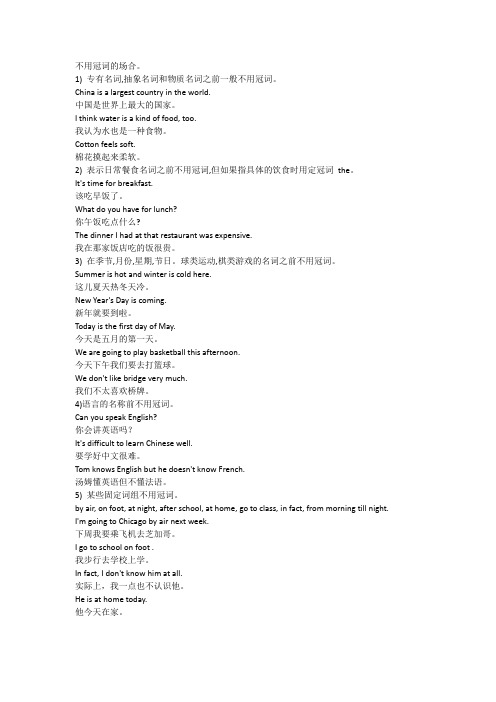
不用冠词的场合。
1) 专有名词,抽象名词和物质名词之前一般不用冠词。
China is a largest country in the world.中国是世界上最大的国家。
I think water is a kind of food, too.我认为水也是一种食物。
Cotton feels soft.棉花摸起来柔软。
2) 表示日常餐食名词之前不用冠词,但如果指具体的饮食时用定冠词the。
It's time for breakfast.该吃早饭了。
What do you have for lunch?你午饭吃点什么?The dinner I had at that restaurant was expensive.我在那家饭店吃的饭很贵。
3) 在季节,月份,星期,节日。
球类运动,棋类游戏的名词之前不用冠词。
Summer is hot and winter is cold here.这儿夏天热冬天冷。
New Year's Day is coming.新年就要到啦。
Today is the first day of May.今天是五月的第一天。
We are going to play basketball this afternoon.今天下午我们要去打篮球。
We don't like bridge very much.我们不太喜欢桥牌。
4)语言的名称前不用冠词。
Can you speak English?你会讲英语吗?It's difficult to learn Chinese well.要学好中文很难。
Tom knows English but he doesn't know French.汤姆懂英语但不懂法语。
5) 某些固定词组不用冠词。
by air, on foot, at night, after school, at home, go to class, in fact, from morning till night. I'm going to Chicago by air next week.下周我要乘飞机去芝加哥。
不用冠词的几种情况
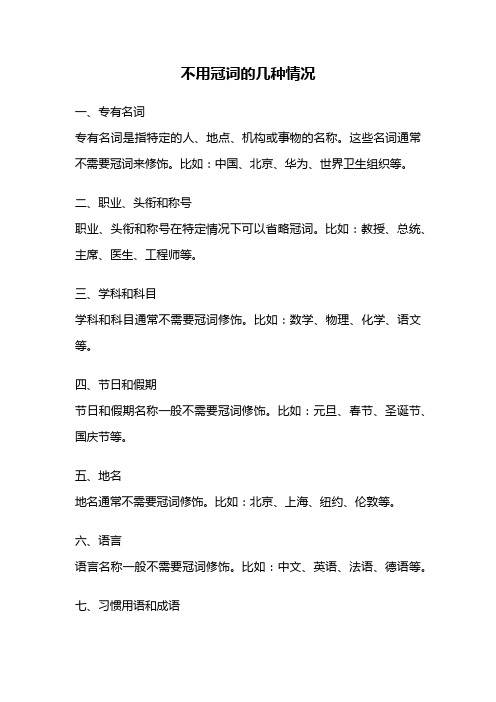
不用冠词的几种情况
一、专有名词
专有名词是指特定的人、地点、机构或事物的名称。
这些名词通常不需要冠词来修饰。
比如:中国、北京、华为、世界卫生组织等。
二、职业、头衔和称号
职业、头衔和称号在特定情况下可以省略冠词。
比如:教授、总统、主席、医生、工程师等。
三、学科和科目
学科和科目通常不需要冠词修饰。
比如:数学、物理、化学、语文等。
四、节日和假期
节日和假期名称一般不需要冠词修饰。
比如:元旦、春节、圣诞节、国庆节等。
五、地名
地名通常不需要冠词修饰。
比如:北京、上海、纽约、伦敦等。
六、语言
语言名称一般不需要冠词修饰。
比如:中文、英语、法语、德语等。
七、习惯用语和成语
习惯用语和成语中的名词通常不需要冠词修饰。
比如:心上人、路上人、吃饭穿衣等。
八、时间表达
时间表达中的星期、月份、季节等通常不需要冠词修饰。
比如:星期一、七月、夏天等。
九、序数词和基数词
序数词和基数词通常不需要冠词修饰。
比如:第一、十二、一百等。
十、部分漏掉冠词的固定短语
有些固定短语中的名词会省略冠词,例如:上学、下班、回家、去医院、上楼、下车等。
以上是一些常见的不用冠词的情况。
在使用时,我们需要根据具体的语境来判断是否需要使用冠词。
正确地使用冠词可以使语言更加准确、流畅。
希望以上内容对您有所帮助。
英语中什么情况下不用冠词

英语中什么情况下不用冠词冠词有一种是不定冠词,也有一种是定冠词,还有一些特殊情况是不需要冠词的。
小编为大家推荐了冠词的语法知识点,一起来看看吧!不用冠词的情况一、定冠词不与表示一类人或事物的复数名词连用。
例如:1. I like reading the books.(×) I like reading books.(√)2. She likes the cats.(×) She likes cats.(√)二、定冠词不能用在某些习惯用语中的名词前面。
例如:1. I have lunch at the noon.(×) I have lunch at noon.(√)2. We go to school by the bus.(×) We go to school by bus.(√)三、定冠词不能用在某些专用名词和不可数名词前面。
例如:1. I like the China.(×) I like China.(√)2. Would you like a cup of the water? (×)Would you like a cup of water?(√)四、定冠词不能用在节日、日期、月份、季节前面。
例如:1. Today is the Teachers’ Day. (×) Today is Teachers’ Day.(√)2. He was born in the May in 1987. (×) He was born in May in 1987. (√)五、定冠词不能用在表示称呼语或某些头衔的名词前面(尤其作表语、宾补时)。
例如:1. Good morning, the sir!(×) Good morning, sir! (√)2. I need some help, the Mummy.(×) I need some help, Mummy.(√)六、定冠词不能与名词前已有作定语用的this, that, my, your, some, any等代词连用。
不用冠词的情 自己总结

不用冠词的情况下列情况应免冠,代词限定名词前;专有名词不可数,学科球类三餐饭;复数名词表泛指,两节星期月份前;颜色语种和国名,称呼习语及头衔。
以上口诀主要概括了不用冠词的一般情况,即:1.名词前已有作定语用的this, that, my, your, some, any等限定词。
如:There are some books here. This book is not mine. My book is over there.2.专有名词和不可数名词前。
如:Mr. Green lives inChina. He likes eating rice.3.表示学科的名词前如:He is good at Chinese, while I do well in English.4.球类活动及一日三餐的名词前。
如:play football /basketball/volleyball, have breakfast/lunch/supperAfter I have supper I go to play football.5.复数名词表示泛指时。
My parents are teachers. They both like students.6.节日、季节、星期、月份前。
September 10th is Teachers’ day.It’s Monday today. Summer is so hot.7.表示颜色、语种和国家的名词前。
He comes from Australia. He can speak English. He loves blue.8.在称呼或表示头衔的名词前。
-What’s up, Dad?–They elected her president.9.某些习惯用语中。
如lose heart, take place, make use of等。
补充:表示乘坐交通工具的短语中不用冠词:如:by bus 乘公共汽车,by bike骑自行车,by plane/by air乘飞机,by ship(boat)坐船,by land 走陆路,by sea从海路。
使用零冠词的八种情况

使用零冠词的八种情况
1. 当泛指物体或概念被提及时,常常不使用冠词。
例如:I love dogs.(我喜欢狗。
)
2. 当表示学科、运动或活动时,通常不使用冠词。
例如:I study physics.(我学习物理。
)She plays basketball.(她打篮球。
)
3. 当表示国籍、宗教、职业或地点时,通常不使用冠词。
例如:He is American.(他是美国人。
)She is a doctor.(她是医生。
)
4. 当表示饮食习惯时,通常不使用冠词。
例如:I love Chinese food.(我喜欢中国菜。
)
5. 当使用名词作为广义概念时,通常不使用冠词。
例如:Music is my passion.(音乐是我的激情。
)
6. 当表示身体部位或疾病时,通常不使用冠词。
例如:She has a headache.(她头疼。
)
7. 当使用专有名词时,通常不使用冠词。
例如:I live in London.(我住在伦敦。
)
8. 当使用复数名词来泛指一类事物时,通常不使用冠词。
例如:Cats are cute.(猫很可爱。
)。
初一英语语法关于不用冠词的场合的顺口溜.doc

初一英语语法关于不用冠词的场合的顺口溜初一大家开始系统的学习英语知识,英语知识点众多,大家在学习的时候要学会归纳和总结,这样才能取得举一反三的学习效果,下面为大家带来初一英语语法关于不用冠词的场合的顺口溜,希望对大家学好初中英语有所帮助。
英语语法顺口溜:不用冠词的场合抽象、物质、专有名,代词基数用作限定;泛指节假季节星期几,球棋、呼语与餐名;刊物、公告与标题,普通名词并列紧相邻;唯一职位,学科与语种,洲、国、省、市、县街路名。
上述口诀用心牢记,并结合下列说明予以理解①抽象、物质名词和专有名词一般无冠词,但物质名词、抽象名词具体化,或专有名词泛指时,常用不定冠词,例:a Mr Wang/a climb/a swim.for a while/in a hurry/a fire Here is a life of struggle.Physics is a science. There was a heavy rain last night.等抽象名词受of 短语修饰或上下文已予限定,用the.如:the science of speech sounds 语音学the music of the film, do me the favor to do sth.②代数词、基数词作前置定词,不用冠词。
③泛指的节假日、季节、星期前不用冠词。
但是季节名词表特定时间或受of知识修饰时用the.如:in the winter of 1948。
有时泛指时间用a+adj+名词。
如:have a hot summer.④餐名前一般无冠词。
但餐名受adj修饰时常常有a(an).特指时用the. 如:have a good supper. The breakfast was well cooked.dinner表宴会时,是可数名词,有各种冠词修饰give a dinner to them.⑤普通名词并列时不用冠词soul and heart/husband and wife/day after day/arm in arm/hand in hand.⑥语种前不用冠词。
不用冠词的情况
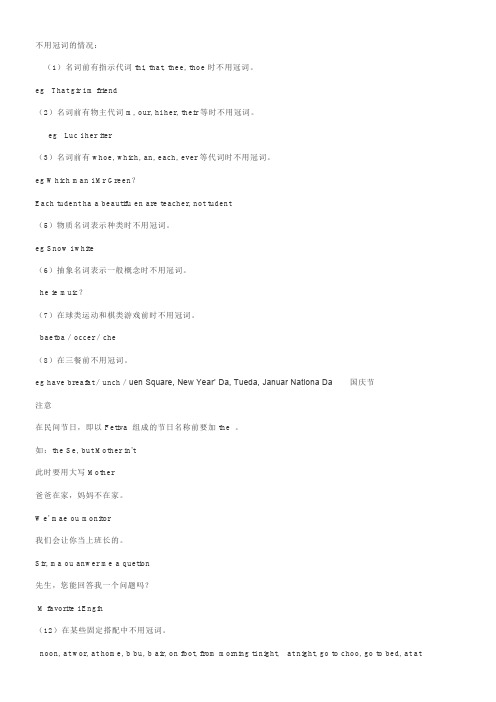
不用冠词的情况:(1)名词前有指示代词thi, that, thee, thoe时不用冠词。
eg That gir i m friend(2)名词前有物主代词m, our, hi her, their等时不用冠词。
eg Luc i her iter(3)名词前有whoe, which, an, each, ever等代词时不用冠词。
eg Which man i Mr Green?Each tudent ha a beautifu en are teacher, not tudent(5)物质名词表示种类时不用冠词。
eg Snow i white(6)抽象名词表示一般概念时不用冠词。
he ie muic?(7)在球类运动和棋类游戏前时不用冠词。
baetba/occer/che(8)在三餐前不用冠词。
eg have breafat/unch/uen Square, New Year’ Da, Tueda, Januar Nationa Da国庆节注意在民间节日,即以Fetiva 组成的节日名称前要加the 。
如:the Se, but Mother in't此时要用大写Mother爸爸在家,妈妈不在家。
We' mae ou monitor我们会让你当上班长的。
Sir, ma ou anwer me a quetion先生,您能回答我一个问题吗?M favorite i Engih(12)在某些固定搭配中不用冠词。
noon, at wor, at home, b bu, b air, on foot, from morning ti night, at night, go to choo, go to bed, at at4在有些词组中,用冠词和不用冠词意思有较大区别。
in ho,ome等时就不用冠词。
V冠词的易错点:1It' time for dinner King are at tabeA /,theB the, theC The,/ D/,/答案: C 在姓氏复数前用the表示一家人,就餐用at tabe2-What do ou uua have for breafat-I often have bread and miA/,/ B/,the C a,/ D the, the答案: A 物质名词前一般不用冠词。
英语语法中哪些情况下可以不用冠词
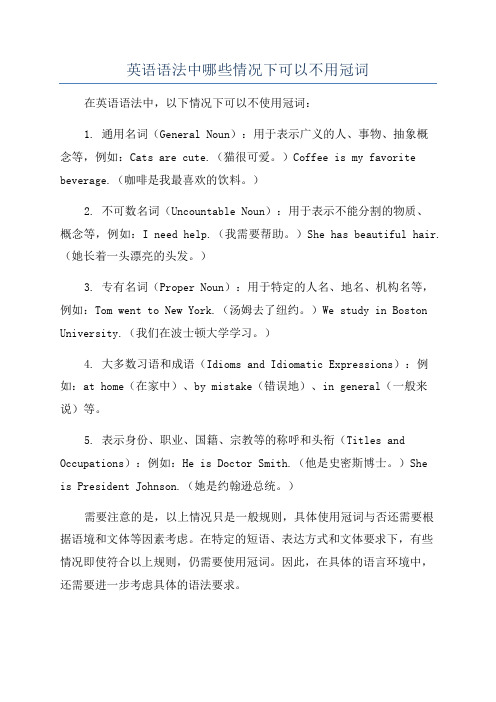
英语语法中哪些情况下可以不用冠词
在英语语法中,以下情况下可以不使用冠词:
1. 通用名词(General Noun):用于表示广义的人、事物、抽象概
念等,例如:Cats are cute.(猫很可爱。
)Coffee is my favorite beverage.(咖啡是我最喜欢的饮料。
)
2. 不可数名词(Uncountable Noun):用于表示不能分割的物质、
概念等,例如:I need help.(我需要帮助。
)She has beautiful hair.(她长着一头漂亮的头发。
)
3. 专有名词(Proper Noun):用于特定的人名、地名、机构名等,例如:Tom went to New York.(汤姆去了纽约。
)We study in Boston University.(我们在波士顿大学学习。
)
4. 大多数习语和成语(Idioms and Idiomatic Expressions):例如:at home(在家中)、by mistake(错误地)、in general(一般来说)等。
5. 表示身份、职业、国籍、宗教等的称呼和头衔(Titles and Occupations):例如:He is Doctor Smith.(他是史密斯博士。
)She is President Johnson.(她是约翰逊总统。
)
需要注意的是,以上情况只是一般规则,具体使用冠词与否还需要根据语境和文体等因素考虑。
在特定的短语、表达方式和文体要求下,有些情况即使符合以上规则,仍需要使用冠词。
因此,在具体的语言环境中,还需要进一步考虑具体的语法要求。
不用冠词的情况

什么情况下不用英语“冠词”作者:网编整理来源:新东方论坛时间:2013-12-09在冠词的学习过程中,什么情况下使用冠词,什么情况下不使用冠词,我们都很熟悉。
但下列不使用冠词的情况我们需特别注意。
1. 表示头衔、职务、职称、身份等的名词,在句中作表语、宾(主)补时,该名词常不与冠词连用。
如:Lincoln became President of the United States. 林肯成为美国总统。
Li Ming was made monitor of our class. 李明被选为我们班的班长。
2. turn作为系动词,且当"变成"解时,其后的表语若为单数可数名词,一般不用冠词。
如:His brother turned thief. 他哥哥成了小偷。
对比:His brother became a thief.但作表语的名词前有形容词修饰时,则该名词前常有不定冠词。
如:His brother turned a great inventor. 他哥哥成了一位伟大的发明家。
3. 书名、标题前一般不用冠词。
如:Do you have "From Earth to Moon"? 你有《从地球到月亮》这本书吗?Have you read "Oliver Twist"? 你读过《雾都孤儿》吗?4. 以as,though引导的让步状语从句,名词放于句首时,该名词前常不用冠词。
如:Child as he is,he knows a lot about it.尽管他是小孩,但这件事他知道很多。
Girl though she was,she dared to face the enemy. 尽管她是女孩,但她敢面对敌人。
5. man,woman表泛指时,常不用冠词,且用单数形式。
如:Man will change nature. 人类将会改变自然。
Man tries to be a protector of woman.男人试图做女人的保护者。
不用冠词的情况_冠词 英语语法.doc
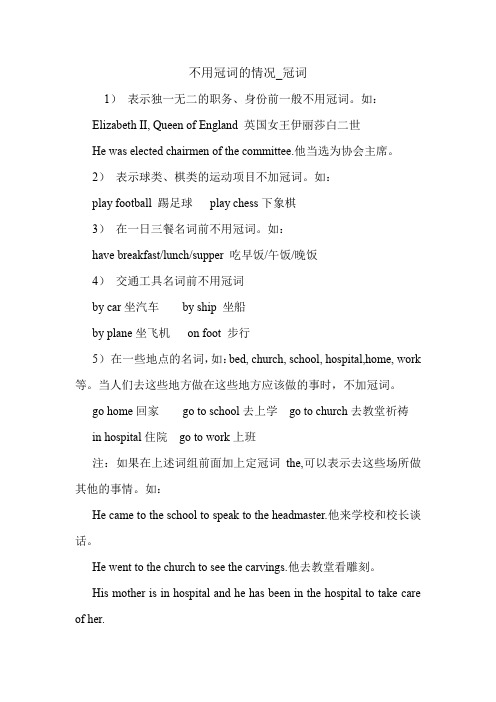
不用冠词的情况_冠词
1)表示独一无二的职务、身份前一般不用冠词。
如:
Elizabeth II, Queen of England 英国女王伊丽莎白二世
He was elected chairmen of the committee.他当选为协会主席。
2)表示球类、棋类的运动项目不加冠词。
如:
play football 踢足球play chess下象棋
3)在一日三餐名词前不用冠词。
如:
have breakfast/lunch/supper 吃早饭/午饭/晚饭
4)交通工具名词前不用冠词
by car坐汽车by ship 坐船
by plane坐飞机on foot 步行
5)在一些地点的名词,如:bed, church, school, hospital,home, work 等。
当人们去这些地方做在这些地方应该做的事时,不加冠词。
go home回家go to school去上学go to church去教堂祈祷in hospital住院go to work上班
注:如果在上述词组前面加上定冠词the,可以表示去这些场所做其他的事情。
如:
He came to the school to speak to the headmaster.他来学校和校长谈话。
He went to the church to see the carvings.他去教堂看雕刻。
His mother is in hospital and he has been in the hospital to take care of her.
他妈妈生病住院了,他就一直在医院里面照顾她。
不使用定冠词的场所

不使用定冠词的场所(1)当名词前有物主代词、指示代词、疑问代词、不定代词和数词等限定词时,不用不定冠词。
No one can destroy the forest in this area.没有人能毁坏本地区的森林。
Whose garage is this?这是谁的车库?This is Uncle Sam's studio.这是山姆叔叔的工作室。
(2)在表是人名、地名的专有名词前(由普通名词构成的专有名词除外),一般不用不定冠词。
John Brown is from New York.约翰?布朗是从纽约来的。
London is the capital of England.伦敦是英国的首都。
(3)表示一日三餐的名词前,一般不用不定冠词。
I had some bread for breakfast.我早饭吃的面包。
They usually have lunch in the factory.他们常常在工厂吃午饭。
注意:但如果这类名词要明确指某一次早、中、晚餐用定冠词,表示一种时可用不定冠词。
What a delicious supper/dinner!多可口的晚餐呀!The breakfast was well cooked.早饭做得不错。
(4)表示日期、月份、季度、日、夜、早、晚、周、年等名词前,一般不用不定冠词。
We celebrate National Day on October 1.我们在十月一日庆祝国庆。
If winter comes, can spring be far behind?冬天到了,春天还会远吗?Evening came on.黄昏来了。
Day is fading into dark.夜色渐浓。
注意:如果该名词被限制性定语修饰,或表示特定的时间,这时须加定冠词。
个别情形下,可用不定冠词,这时表示“某一个,一种”等概念。
The building was built in the spring of 1980.该楼房建于1980年春天。
一些不用冠词的情况
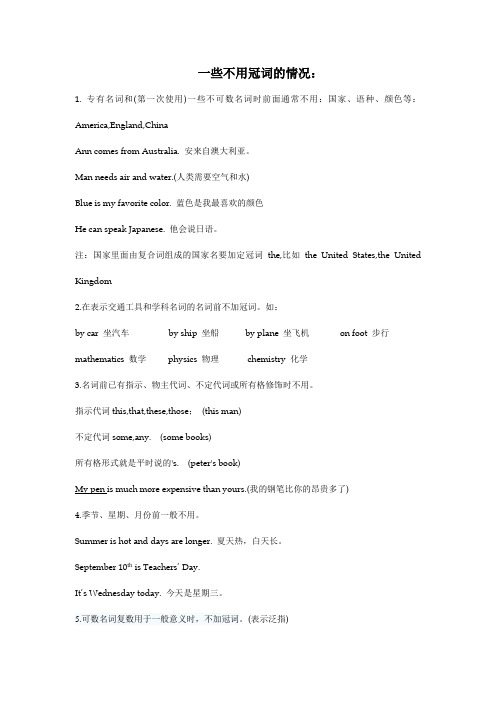
一些不用冠词的情况:1. 专有名词和(第一次使用)一些不可数名词时前面通常不用:国家、语种、颜色等:America,England,ChinaAnn comes from Australia. 安来自澳大利亚。
Man needs air and water.(人类需要空气和水)Blue is my favorite color. 蓝色是我最喜欢的颜色He can speak Japanese. 他会说日语。
注:国家里面由复合词组成的国家名要加定冠词the,比如the United States,the United Kingdom2.在表示交通工具和学科名词的名词前不加冠词。
如:by car 坐汽车by ship 坐船by plane 坐飞机on foot 步行mathematics 数学physics 物理chemistry 化学3.名词前已有指示、物主代词、不定代词或所有格修饰时不用。
指示代词this,that,these,those;(this man)不定代词some,any. (some books)所有格形式就是平时说的's. (peter's book)My pen is much more expensive than yours.(我的钢笔比你的昂贵多了)4.季节、星期、月份前一般不用。
Summer is hot and days are longer. 夏天热,白天长。
September 10th is Teachers’ Day.It’s Wednesday today. 今天是星期三。
5.可数名词复数用于一般意义时,不加冠词。
(表示泛指)They are teachers.他们是老师。
Tigers like meat.老虎喜欢吃肉Books may not be taken out of the library. 图书馆的图书不得携出馆外。
注:如果复数名词表示特指,则在其前用定冠词The books sold out in a week. 书在一周内售完了。
不用冠词的场合有哪些

不用冠词的场合有哪些冠词是用在名词前面,帮助说明名词所指的人或事物的词语,在英语中,有些场合是不需要加冠词的。
小编为大家力荐了不用冠词的场合,给大家作为参考,欢迎阅读!不用冠词的场合①抽象、物质名词和专有名词一般无冠词,但物质名词、抽象名词具体化,或专有名词泛指时,常用不定冠词,例:a Mr Wang/a climb/a swim.for a while/in a hurry/a fire Here is a life of struggle.Physics is a science. There was a heavy rain last night.等抽象名词受of短语修饰或上下文已予限定,用the.如:the science of speech sounds 语音学the music of the film, do me the favor to do sth.②代数词、基数词作前置定词,不用冠词。
③泛指的节假日、季节、星期前不用冠词。
但是季节名词表特定时间或受of知识修饰时用the.如:in the winter of 1948。
有时泛指时间用a+adj+名词。
如:have a hot summer.④餐名前一般无冠词。
但餐名受adj修饰时常常有a(an).特指时用the.如:have a good supper. The breakfast was well cooked.dinner表“宴会”时,是可数名词,有各种冠词修饰give a dinner to them.⑤普通名词并列时不用冠词soul and heart/husband and wife/day after day/arm in arm/hand in hand.⑥语种前不用冠词。
但the English结构用the。
What's the English for labour.The English of shakespear.作限定时用the.不用冠词的语法顺口溜抽象、物质、专有名,代词基数用作限定;泛指节假季节星期几,球棋、呼语与餐名;刊物、公告与标题,普通名词并列紧相邻;唯一职位,学科与语种,洲、国、省、市、县街路名。
小学英语语法不用冠词情况
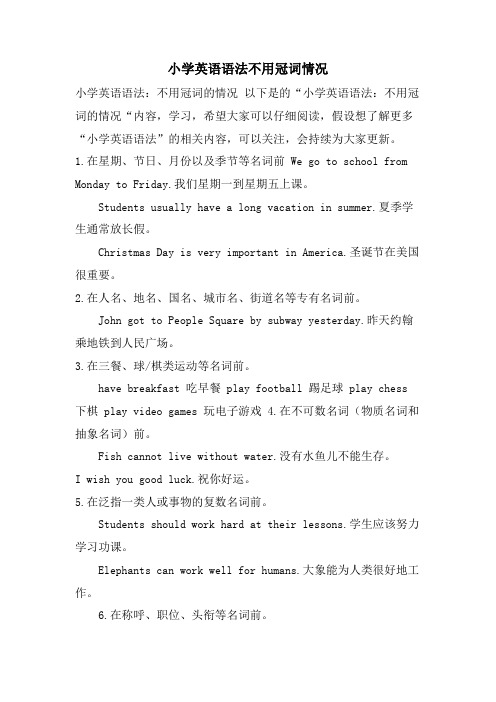
小学英语语法不用冠词情况小学英语语法:不用冠词的情况以下是的“小学英语语法:不用冠词的情况“内容,学习,希望大家可以仔细阅读,假设想了解更多“小学英语语法”的相关内容,可以关注,会持续为大家更新。
1.在星期、节日、月份以及季节等名词前 We go to school from Monday to Friday.我们星期一到星期五上课。
Students usually have a long vacation in summer.夏季学生通常放长假。
Christmas Day is very important in America.圣诞节在美国很重要。
2.在人名、地名、国名、城市名、街道名等专有名词前。
John got to People Square by subway yesterday.昨天约翰乘地铁到人民广场。
3.在三餐、球/棋类运动等名词前。
have breakfast 吃早餐 play football 踢足球 play chess 下棋 play video games 玩电子游戏 4.在不可数名词(物质名词和抽象名词)前。
Fish cannot live without water.没有水鱼儿不能生存。
I wish you good luck.祝你好运。
5.在泛指一类人或事物的复数名词前。
Students should work hard at their lessons.学生应该努力学习功课。
Elephants can work well for humans.大象能为人类很好地工作。
6.在称呼、职位、头衔等名词前。
Mom, I"m not feeling well now.妈妈,我现在感觉不舒服。
David, head of the group, will help us.小组的组长大卫将帮助孩子们。
7.当名词前已有指示代词、物主代词及 some, many 等修饰时。
英语语法学习:零冠词的情况

英语语法学习:零冠词的情况零冠词就是不用冠词,不用a / an,也不用the,主要有以下几种情况:1、人名、地名、国家名等专有名词前,通常不用冠词,例如:Maria is from Germany.(玛丽亚来自德国。
)2、表示独一无二的职位或身份,一般不用冠词,例如:He was selected President of the United States.(他被选为美国国家总统。
)3、表示球类、棋类等运动项目,不用冠词,例如:play football(踢足球)play chess(下象棋)4、在一日三餐名词前不用冠词,例如:have breakfast(吃早餐)have lunch(吃午饭)但如果前面有形容词修饰,要加不定冠词,例如:We had a big dinner this evening.(我们今晚吃了顿丰盛的晚餐。
)如果后面有定语修饰,要加定冠词,例如:The lunch I had today was great.(我今天吃的午餐太棒了。
)5、当用“by表示乘坐某种交通工具时,名词前不用冠词,例如:by car(坐汽车)by ship(坐船)by bus(坐公共汽车)by air(坐飞机)on foot(步行)也不用冠词。
6、可数名词复数泛指一类人或事物时,前面不加冠词,例如:Tom and Tony are school teachers.(汤姆和托尼都是学校教师。
)Apples are round.(苹果是圆的。
)7、抽象名词、物质名词等泛指一般概念时,前面不加冠词,例如:Man can not live without water.(人离开水无法生存。
)She loves music.(她热爱音乐。
)8、节日、季节等名词前不加冠词,例如:Children’s Day(儿童节)Mother’s Day(母亲节)注意:我国的传统节日前要用定冠词,例如:the Spring Festival(春节)the Mid-Autumn Day(中秋节)9、年份、月份、星期、日期等名词前不加冠词,例如:We work from Monday to Friday.(我们星期一到星期五上班。
一些不用冠词的情况(推荐文档)
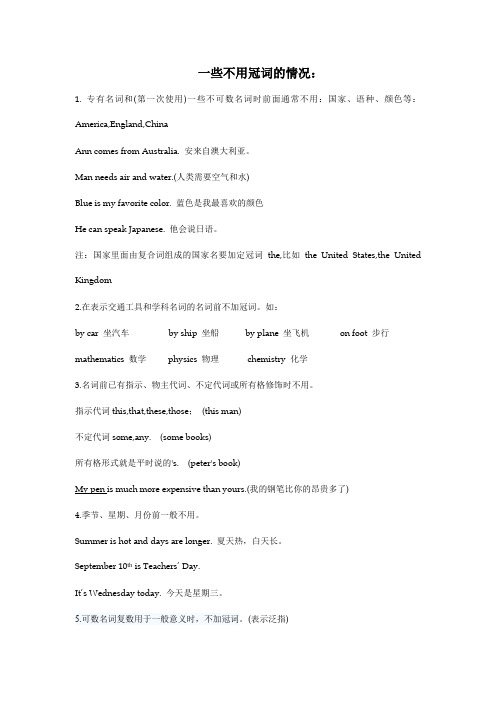
一些不用冠词的情况:1. 专有名词和(第一次使用)一些不可数名词时前面通常不用:国家、语种、颜色等:America,England,ChinaAnn comes from Australia. 安来自澳大利亚。
Man needs air and water.(人类需要空气和水)Blue is my favorite color. 蓝色是我最喜欢的颜色He can speak Japanese. 他会说日语。
注:国家里面由复合词组成的国家名要加定冠词the,比如the United States,the United Kingdom2.在表示交通工具和学科名词的名词前不加冠词。
如:by car 坐汽车by ship 坐船by plane 坐飞机on foot 步行mathematics 数学physics 物理chemistry 化学3.名词前已有指示、物主代词、不定代词或所有格修饰时不用。
指示代词this,that,these,those;(this man)不定代词some,any. (some books)所有格形式就是平时说的's. (peter's book)My pen is much more expensive than yours.(我的钢笔比你的昂贵多了)4.季节、星期、月份前一般不用。
Summer is hot and days are longer. 夏天热,白天长。
September 10th is Teachers’ Day.It’s Wednesday today. 今天是星期三。
5.可数名词复数用于一般意义时,不加冠词。
(表示泛指)They are teachers.他们是老师。
Tigers like meat.老虎喜欢吃肉Books may not be taken out of the library. 图书馆的图书不得携出馆外。
注:如果复数名词表示特指,则在其前用定冠词The books sold out in a week. 书在一周内售完了。
零冠词 的用法归纳总结
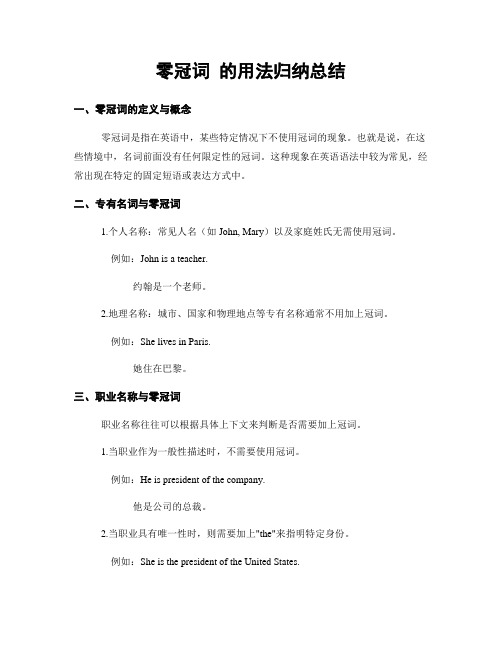
零冠词的用法归纳总结一、零冠词的定义与概念零冠词是指在英语中,某些特定情况下不使用冠词的现象。
也就是说,在这些情境中,名词前面没有任何限定性的冠词。
这种现象在英语语法中较为常见,经常出现在特定的固定短语或表达方式中。
二、专有名词与零冠词1.个人名称:常见人名(如John, Mary)以及家庭姓氏无需使用冠词。
例如:John is a teacher.约翰是一个老师。
2.地理名称:城市、国家和物理地点等专有名称通常不用加上冠词。
例如:She lives in Paris.她住在巴黎。
三、职业名称与零冠词职业名称往往可以根据具体上下文来判断是否需要加上冠词。
1.当职业作为一般性描述时,不需要使用冠词。
例如:He is president of the company.他是公司的总裁。
2.当职业具有唯一性时,则需要加上"the"来指明特定身份。
例如:She is the president of the United States.她是美国总统。
四、语言与零冠词当我们用具体的语言名称描述时,通常不使用冠词。
例如:He speaks fluent French.他流利地讲法语。
五、学科名称与零冠词学科名称通常无需加上冠词。
例如:She is studying chemistry.她正在学化学。
六、节日与零冠词节日名称一般不需要加上冠词。
例如:We celebrate Christmas every year.我们每年庆祝圣诞节。
七、部分短语中的零冠词现象在一些特定的固定表达方式或短语中,名词前也可以省略限定性的冠词。
1.在做某些运动或玩乐类活动方面:- I like playing basketball.我喜欢打篮球。
- He goes swimming every weekend.他每个周末去游泳。
2.在表示就餐或饮食方面:- Let's have lunch together.让我们一起吃午餐吧。
英语语法中哪些情况下可以不用冠词
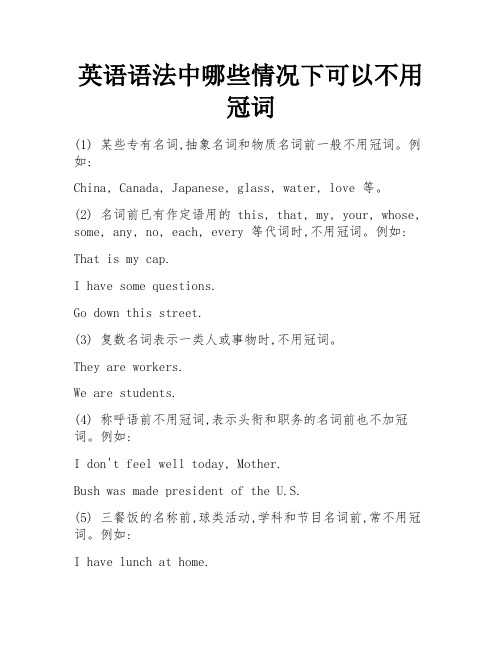
英语语法中哪些情况下可以不用冠词(1) 某些专有名词,抽象名词和物质名词前一般不用冠词。
例如:China, Canada, Japanese, glass, water, love 等。
(2) 名词前已有作定语用的 this, that, my, your, whose, some, any, no, each, every 等代词时,不用冠词。
例如:That is my cap.I have some questions.Go down this street.(3) 复数名词表示一类人或事物时,不用冠词。
They are workers.We are students.(4) 称呼语前不用冠词,表示头衔和职务的名词前也不加冠词。
例如:I don't feel well today, Mother.Bush was made president of the U.S.(5) 三餐饭的名称前,球类活动,学科和节目名词前,常不用冠词。
例如:I have lunch at home.He often plays football after class.We have English and maths every day.(6) 在某些固定词组里,名词之前常不用冠词。
例如:By air, at night, at home, go to bed, go to school, on foot, from morning till night 等。
好的,请记住以上情况。
在语言练习中,不仅要记住一般的语法规则,还要掌握一些名词的内在含义,才能做好相关题目。
- 1、下载文档前请自行甄别文档内容的完整性,平台不提供额外的编辑、内容补充、找答案等附加服务。
- 2、"仅部分预览"的文档,不可在线预览部分如存在完整性等问题,可反馈申请退款(可完整预览的文档不适用该条件!)。
- 3、如文档侵犯您的权益,请联系客服反馈,我们会尽快为您处理(人工客服工作时间:9:00-18:30)。
不用冠词的场合1.可数名词复数、不可数名词表示一类或泛指时e.g.: Teachers must love their students.Unity is strength.2.专有名词(洲、国家、人名)前,一般不用冠词e.g.: Asia, Japan, Jim3.球类、棋类等体育运动以及三餐前e.g.: play (volleyball, table tennis, chess, cards)have (breakfast, lunch, dinner)注:如特指某一餐,需加不定冠词a/ane.g.: They had a wonderful dinner at that hotel last night.4.学科、语言、(医学中)大部分疾病名、某些报刊名前e.g.: chemistry, English, High blood pressure, China Daily5.季节、月份、星期、节日前,一般不加冠词,但有限定性定语修饰或表示一特定的时间时,就要加定冠词e.g.: School begins in September.We have few classes on Saturday.但:She came to Tianjin in the spring of 1998.Where do you plan to spend the summer?6.大多数学校、街道、公园、广场、桥梁、车站、机场等名称前e.g.: Tian An Men Square, Nanjing Road, Tianjin Railway Station7.在描述交通方式时e.g.: by car, by bus, by bike, by train, on foot, etc.I go to school by bike every day.但take a bus, come in a boat, on the train/bus 等表示具体的交通工具时要用冠词8.系动词turn(变成)后面作表语的单数可数名词前习惯不用冠词e.g.: The young worker has turned writer.=The young worker has become a writer.9.称呼语或指家里雇用的nurse, cook 等名词前及表示独一无二的头衔、职务的名词作宾语、补语及同位语时,一般不加冠词e.g.: What’s this, mother?Ask nurse to put the child to bed.Lincoln was made president of the United States again.10.As引导的让步状语从句,作表语的名词前不用冠词e.g.: Child as she is, she knows a lot of English.11.⑴在单数名词+after +同一单数名词(表示“一个接一个”)结构中,单数可数名词前不加冠词e.g.: She did experiment after experiment.shop after shop, mistake after mistake, etc.⑵当两个或两个以上的名词用and 连接时,如带有对比的含义或习惯上总在一起使用,常省去冠词e.g.: husband and wife, brother and sister, day and night,body and soul, knife and fork12.当两个形容词最高级并列修饰同一名词时,第二个形容词前常不用thee.g.: She is the tallest and fattest girl in our class.13.No 与such 连用时,no 应放在such 之前,such 后的名词前不用冠词e.g.: No such thing has ever happened in this village.14.church, school, hospital, prison, university 等单数可数名词指机构(institution)时,其前常不用冠词;如果不指机构而指一座具体建筑(building),其前又常用冠词。
e.g.: They go to church every Sunday morning.(上教堂)The church was pulled down for a new and bigger one.She stayed in hospital for three weeks after the accident.(住院)He walked into the hospital through a side entrance.注:用法类似的词还有:bed, class, table, town 等。
e.g.: The family were at table when he arrived.(在吃饭)Why not remove the table? It’s in the way.You’re not going to town with him, are you?(进城)The town used to be rather small. Now it extends miles and miles.15.有时在新闻标题、工商业文件、广告、电报、公告、提纲、书名中,为了节省空间、时间、金钱和精力,或为了引起注意,省去冠词e.g.: Conference opens.不定冠词的主要用法1.表示“一”这个数量概念,比one意思稍弱e.g.: The plan will be ready in a week or two.2.表示某人或某物,但不具体说明哪个, 相当于anye.g.: This poem was written by a student.注:在1,2两项中,如果名词变复数,把a换成数词或不定代词some, any等即可。
e.g.: The plan will be ready in three weeks.3.表示某一类人或事物e.g.: Even a child can answer this question.注:句中名词变复数时,去掉不定冠词a/an即可。
4.和表示时间或度量衡的名词连用表示“每日”、“每斤”等e.g.: I take a two-mile walk twice a day.5.用于固定词组e.g.: have/take a shower have/take a bathtake a walk give a lecturea lot of a couple ofas a rule have a headachea few a little a bit6. 不定冠词用于有形容词修饰的季节, 日期前面The traffic accident happened on a Sunday towards the end of July.7. 用于序数词前面, 表示定冠词的主要用法1.特指某人、某物,以区别于其他人、物e.g.: This is the head of our delegation.2.用于谈话双方都明确的人、物前e.g.: Take the medicine after meals.3.用于上文提到过的人、物前e.g.: There is a new book on the desk. Give me the book.4.用于世界上独一无二的事物前e.g.: the (sun, moon, earth, sky, world, globe, equator(赤道), universe(宇宙), atmosphere)5.用于序数词前e.g.: the first one, the second one, etc.6.用于形容词最高级前e.g.: Autumn is the best season here.7.用于表示方位(东、西、南、北、中、左、右)的名词前e.g.: Tianjin is in the east of China.但from east to west 之类的结构除外8.用于某些江、河、湖、海、山川、海湾、沙漠前e.g.: the Yangtze River, the Yellow River, the Baltic (Sea)(波罗的海),the Himalayas(喜马拉雅山), the Taiwan Straits, the Sahara(撒哈拉沙漠)9.用于由普通名词构成的专有名词前,如国家、组织机构、某些报纸名e.g.: the People’s Republic of China, the United Nations, the Times, the People’s Daily 10.用于姓氏复数前,表示一家人,e.g.: the Browns 布朗一家11.用于形容词前,表示一类人,e.g.: the old, the poor12.用于演奏的乐器、文娱艺术活动等名称前e.g.: play (the piano, the violin, the flute, the cello),go to (the cinema,, the theatre, the movies, the concert)13.用于逢十的复数数词之前,指世纪的某个年代e.g.: in the 1990s (二十世纪九十年代)14.用于表示发明物的单数名词前e.g.: Alexander Graham Bell invented the telephone in 1876.15.用于单数可数名词前,表示某一类人或事物e.g.: The horse is a useful animal.16.当用来指人体部位时,在介词之后通常用the 来代替物主代词e.g.: I had a cold in the head.(头部受了风)He became very red in the face.He was wounded in the leg.He took (lead, seize, catch) me by the arm (hair…).beat sb. on the nose/head,be blind in the left (right) eyebe deaf in the left (right) ear17.用于某些固定词组e.g.: in the morning (afternoon, evening, daytime)at the momenton the phonethe whole dayby the wayin the endon the other handon the whole (大体上) 对应的as a whole (就整个来看) in the city 对应的in townat the back of(in back of) 对应的in front of (在…前面) 在…后面in the distance (在远处) 对应的at a distance of +数词。
